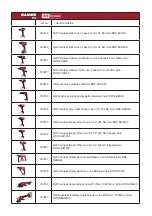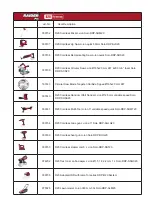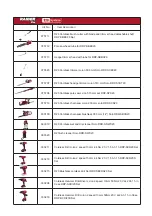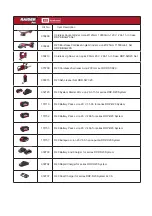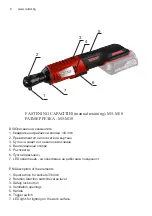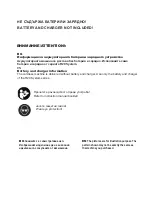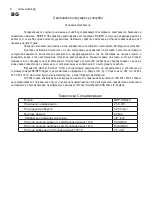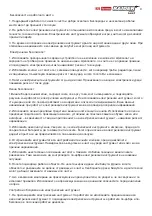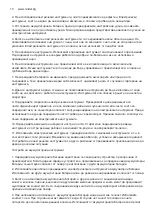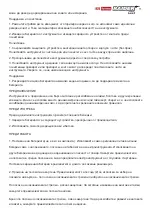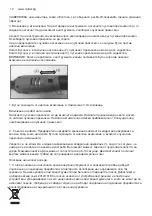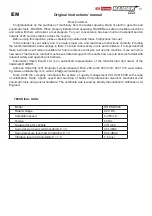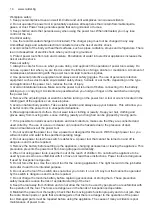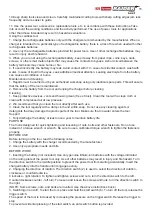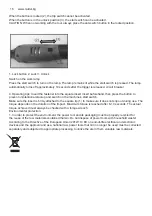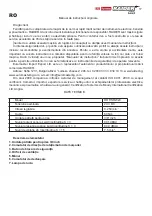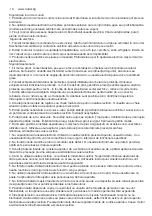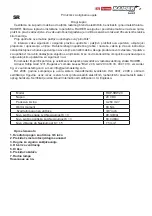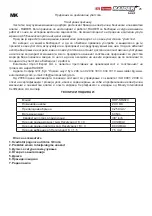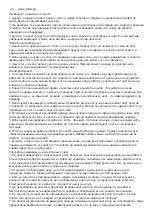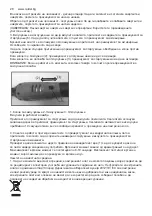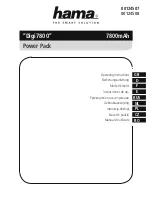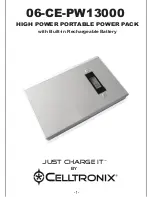
14
www.raider.bg
Workplace safety
1. Keep your workplace clean and well lit. Clutter and unlit workplaces can cause accidents.
2. Do not operate the power tool in potentially explosive atmospheres that contain flammable liquids,
gases, or dust. Power tools generate sparks that can ignite dust or fumes.
3. Keep children and other persons away when using the power tool. When distracted, you may lose
control of the tool.
Electrical safety
1. Use the recommended charger (not included). The charger plug must not be changed in any way.
Unmodified plugs and suitable electrical contacts reduce the risk of electric shock.
2. Avoid contact of the body with earthed surfaces, such as pipes, radiators, stoves and refrigerators. There
is an increased risk of electric shock when your body is grounded.
3. Protect power tools from rain and moisture. Penetration of water into electrical appliances increases the
risk of electric shock.
Personal safety
1. Always be careful, focus on what you are doing, and approach the operation of power tools wisely. Do
not use a power tool when you are tired or under the influence of drugs, alcohol or medication. A moment of
carelessness when working with the power tool can lead to serious injuries
2. Use personal protective equipment and always wear safety goggles. The use of personal protective
equipment such as dust masks, slip-resistant safety shoes, helmets or ear muffs - depending on the type
and application of the power tool - reduces the risk of injury.
3. Avoid unintentional release. Make sure the power tool is turned off before connecting it to the battery,
picking it up, or carrying it. Accidents are possible when you hold your finger on the switch when carrying
the power tool.
4. Remove the adjusting tools or wrenches before turning on the power tool. A tool or wrench located in the
rotating part of the appliance can cause injuries.
5. Avoid unnatural body position. Take a stable position and always keep your balance. This will allow you
to better control the power tool in unexpected situations.
6. Wear appropriate work clothes. Do not wear loose clothing or jewelry. Keep your hair, clothing and
gloves away from moving parts. Loose clothing, jewelry and long hair can be gripped by moving parts.
7. If it is possible to install vacuum cleaners and dust collectors, make sure that they are connected and
used correctly. The use of a vacuum cleaner can reduce the hazards due to the presence of dust.
Use and maintenance of the power tool
1. Do not overload the power tool. Use a power tool designed for this work. With the right power tool, you
will work better and safer in the specified operating range.
2. Do not use power tools whose switch is defective. A power tool that cannot be turned on and off is
dangerous and must be repaired.
3. Remove the battery before setting up the appliance, changing accessories or leaving the appliance. This
precaution prevents the power tool from being dropped accidentally.
4. When not using power tools, keep them out of the reach of children. Do not allow the appliance to be
used by persons who are unfamiliar with it or have not read these instructions. Power tools are dangerous
if used by inexperienced people.
5. Do not force the tool. Use the correct tool for the running application. The right tool will do the job better
and safer if used for its intended purpose.
6. Do not use the tool if the switch does not allow you to turn it on or off. Any tool that cannot be operated
by the switch is dangerous and must be repaired.
7. Do not charge the machine battery before replacing accessories or storing them. These preventive
safety measures reduce the risk of accidental starting of the tool.
8. Keep the tool away from children and do not allow the tool to be used by people who are unfamiliar with
the operation of the tool. The tools are dangerous in the hands of inexperienced operators.
9. Maintain the power tool thoroughly. Check that the moving parts function properly and do not jam, that
there are broken parts or parts that are damaged so that there is a danger to the operation of the power
tool. Damaged parts must be repaired before using the appliance. The cause of many accidents is poor
maintenance of power tools.


